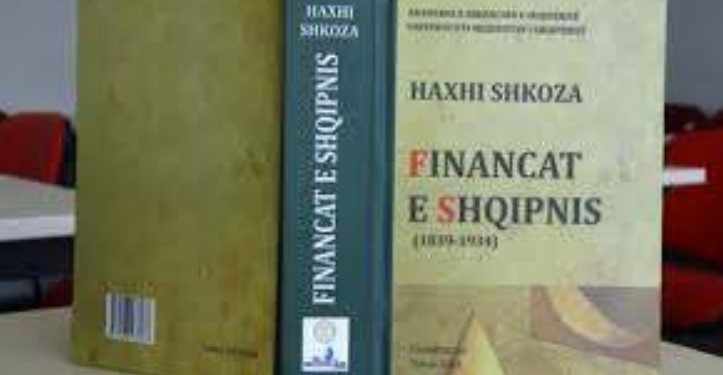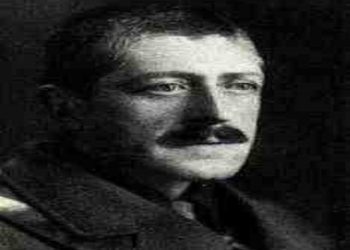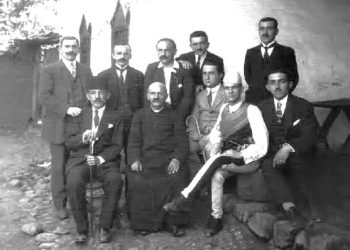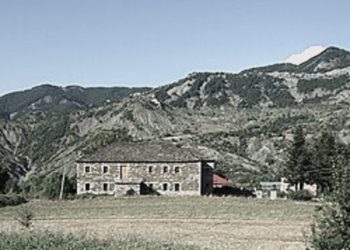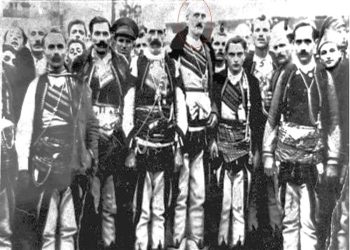
By Adrian Civici
“Encyclopedia” of Albanian finance 1839-1934
Memorie.al/The life and work of one of the first figures and with an important contribution to the Albanian economic thought and to the treatment of the history of Albanian finances.
His book “Financat e Shqipnis 1839-1934” was republished in 2016 by the Academy of Sciences and the Mediterranean University of Albania and is now available in libraries and libraries of the country
In the history of the economy and finances of Albania, in the period of the Ottoman Empire and the first years of the Albanian Kingdom of King Zog, the work of Haxhi Shkoza “Finances of Albania 1839-1934”, former general inspector of finances of the royal court, is a of the most precious stones of the analysis and explanation of this history.
The book “Financat e Shqipnis 1839-1934” was published in November 1934 by the printing house “Nikaj”, a public printing house founded by the clergyman and patriot Dom Ndoc Nikaj in 1909 in Shkodra, while in 1920 he built a second printing house in Tirana, which functioned until the end of World War II.
Haxhi Shkoza is an important figure with a special contribution to the treatment of the history of Albanian finances and Albanian economic thought. He was born in Tirana on March 31, 1888, he completed primary school in Tirana and high school in Bitola.
He was fluent in Turkish, Italian and Arabic. He started his career as an administrator of the finance office in the city of Berat and later in the financial administration of Vlora. Later, he was appointed Director of the Revenue Directorate at the Ministry of Finance and Inspector General of the Royal Court and Director General of the Albanian Red Cross. Towards the end of his career, in the years 1944-1953, he worked as chief accountant in a service barber cooperative. He died on March 23, 1957. He is considered one of the best scholars and connoisseurs of the finances of Albania of the Ottoman period and the Albanian State of the years 1912-1934.
Shkoza, as an economics researcher
This voluminous book of over 900 pages structured in 78 chapters, can be considered as one of the first complete and serious publications of the history of economy and finance of Albania for a period of one century, 1839-1934, since the time of the reforms of Tanzimat that particularly affect the Albanian lands in the administrative, legislative, financial and fiscal aspect, until the first years of the Albanian Monarchy founded in 1928.
The researcher Dashnor Kaloci, underlines the fact that from the first moments the publication of the work “Albanian Finance” was greeted by many high personalities of that time, starting from the Prime Minister Mehdi Frashëri, the Minister of Finance, Abdurrahman Dibra, the Secretary General of of this ministry, Rrok Gera, Minister of Justice, Vasil Avrami, Minister of Education, Mirash Ivanaj, Mayor of Vlora, Ali Asllani, General Director of Customs, Muharrem Kokona, etc. In their writings published in the press of the time, as well as in the greeting letters they sent to the author of the book, Mr. Haxhi Shkoza, they gave their evaluations with many superlatives for the book, highlighting the missing values of that publication until then “.
Quite significant is the assessment of the then Prime Minister Mehdi Frashëri, who explains the importance of this book: “Albania’s financial system consists of two parts: The part inherited from Turkey, and the part added by independent Albania.
A state, intentionally or unintentionally, when separated from the body of another larger state, necessarily and for a long time, has to implement the financial system of the state from which it is inherited. The subsequent needs of the new state cause changes in the old payments and the creation of new payments shqiptare Albanian finances still bear the stamp of these difficulties.
Haxhi Shkoza, in a liked and scientific way, has described the origin, the following developments for each contribution or tax inherited from the previous regime, as well as the modified part of Albania… By studying this book, we will understand the reasons for the difference that exist between the Albanian financial system and the countries of different of the West ”.
While Haxhi Shkoza himself, in the preface of the book, states that “in this book I have tried to summarize all the revenues of the State, old and new, describing how it was in reality, the principles that have promoted and guided them. I started in the time of Tanzimat, in 1839, I finish with the current laws voted by the National Parliament at the end of the session of March 1934…
The publication of this book was also motivated by the desire to make a work that reflects the historical development of Albania’s finances in a concise form and thus contribute, after my strength, to the development of the study of the financial situation of the country from a region as wider nationally of any category, in order to serve at least the highest goal, which is the cultural progress of the Albanian people ”.
Interesting parts of the history of Albania’s finances in the period analyzed by Haxhi Shkoza in his book are related to the creation of the “Ottoman Imperial Bank” in February 1863 as a issuing and credit bank, which can be considered as the first institute financial system built on the basis of modern criteria of monetary banking activity in the Ottoman Empire.
In Albanian areas it established branches in the centers of 4 vilayets, in Shkodra, Skopje, Bitola, Ioannina. It is the first bank in the Ottoman Empire to introduce the durable banknote, which spread to Albania. It is at the same time the first modern bank, which, although a foreign institution, operated for a long time banking activities in Albanian areas. The establishment of the Ottoman Bank in Albania was realized on February 17, 1875 and continued its activity in the beginning of 1911.
According to Haxhi Shkoza, at the beginning of 1913, in the newly created Albania, a financial institution called “National Bank of Albania” was established for the first time, the establishment of which was based on the concession of October 1913, signed between the Albanian government. of that time and Baron Karol Pitner and Oskar Pollak, representatives of Wener bank Verein based in Vienna and Petro Fengolio and Gido Ansbacher on behalf of Banca Commerciale Italiane based in Milan.
The bank started its activity immediately in October 1913, while the government of Ismail Qemali again called on the rich to deposit their free money in the bank. However, the great internal unrest involving Albania in the period 1914-1920, led to the closure of this financial institution, which laid the first foundations of the establishment of the Albanian banking system and the National Bank of Albania itself, which would be reorganized in 1921 to be officially established on September 2, 1925, giving the country the first Albanian national currency “gold franc” with its sub-currencies in “lek”
Albania’s first money was printed in 1926, a process in which several prestigious foreign companies for the time were engaged. The British company Bradbury Wilkinson & Co was selected for the 5, 20 and 100 franc denominations, while the Italian company Richter & Co was selected for the 1 franc banknote. Haxhi Shkoza writes that the 1 franc (5 lek) banknotes printed by “Richter & Co” were immediately removed from circulation after the Albanian government of the time did not accept them because the 1 franc (5 lek) banknotes had as identification element the Roman eagle with 1 head and not the Albanian one with two heads. The other banknotes from the English company, were initially printed 5 thousand gold francs, divided into 20 franc denominations, which were put into circulation in 1926.
In his book, Haxhi Shkoza devotes a considerable part to the history of the tax system and the rules of operation of the customs in Albania. In the period of the Ottoman Empire 1839-1912, in the Albanian vilayets, “customs duty” was divided into four types: consumption, import, export and transit, while customs operations were of two types: foreign customs – related to customs duties on trade with foreign countries; and internal customs – relating to the obligations imposed by the Turkish State on any country under the rule of the Ottoman Empire, administered as “border customs”, “land customs” and “port customs”.
After 1912, the Albanian customs and customs administration began to function under a new legislation. Thus, for example, as Haxhi Shkoza explains, a customs tax of 11% was imposed on the value of imported goods and 1% on the value of exported goods, a special tax of 30% was imposed on tobacco imports, etc.
In the years of World War I, during the Government of Durrës, the Albanian customs functioned more or less in function of the customs provisions of the countries of the occupying armies. From 1920 to 1934, the Albanian customs and fiscal system was reorganized, referring in many cases to examples from developed European countries. Haxhi Shkoza pays attention to the laws and the process of modernization of all problems related to accounting, administration of the treasury system, payment system, etc., concretized in the special law of 1929 “On Asset Management and General Accounting” of the State ”.
The descriptions and analyzes regarding the ways of collecting revenues from concessions, especially those of mineral resources, are also very interesting. After explaining in detail how the system and legislation of concessions worked until 1912, Haxhi Shkoza pays special attention to the fact that in the 1920s and 1930s, although Albania was a poor country and quite economically backward, governments of this period took care to draft and implement a modern legislation similar to developed European countries, inviting well-known companies of these countries to come to invest in Albania, but in some cases, when the concession contracts were not implemented according to the agreement , measures and decisions have been taken to seize their guarantees.
Regarding this issue, Shkoza writes that “in 1925, several exploiting companies appeared and applied for concessions for the exploration and use of rock oil in different areas of Albania. Conventions have been made between the Government and the aforementioned companies and have been submitted to the Legislative Chambers. These have been voted on by the Chambers from time to time and decrees and announcements are regularly made in a prominent manner. Tue considering that with the exception of some changes such as in surface areas, guarantees and dates of decrees, act-concessions, are almost composing with the same provisions as being type contracts. The concession companies “Standard Oil Company” and H.H. Rustan ”, can not comply with the contractual obligations on the commencement of works and others and therefore the Government has taken the necessary decisions (DCM No. 543. dated 14.VI. 1929) to seize their guarantees and are implemented “.
The book “Albanian Finance”
In the book “Finances of Albania” there is a lot of other interesting information about the ways in which taxes and fees were built and administered. One of these was, for example, the “road tax” for both the Ottoman period of the Albanian vilayets and the years 1912-1934. In the years 1839-1870, there was a unique road tax, the income of which went mainly for the construction of roads, bridges and railways, while after the Tanzimat period, 1870-1912, road taxes and duties were regulated by a law of special, according to which “every man aged 16-60 was obliged to work 4 days a year for road construction”.
In 1887, the option of repayment through payment for installments that did not want to work was added, while in 1910, the law changed again making only the payment in cash of this tax mandatory. In 1912, it turns out that Albania had only 138 km of roads built. According to Haxhi Shkoza, after the declaration of independence, the road tax continued to be collected in the same way as in previous periods, excluding only foreigners from this type of obligation.
Haxhi Shkoza also shows the “functioning of the quarantine tax at the border points of Albania that was taken from travelers” who entered the Albanian territories which was called “Personal health tax”, as well as the “veterinary tax” paid for the entry of animals and their products , which was called “Animal Health Tax”.
The size of the tax was categorized and differentiated based on the size of the ships and their cargo. At the same time, an additional fee was paid for “disinfection of clothes”. This system of taxes and duties remained in force until 1920, while in a special law of June 1927, it was ordered that in every port of the country to be established and function maritime health offices and health guards, to create quarantine facilities specific to people and animals.
The book “Finansat e Shqipnis 1839-1934” was republished in 2016 by the Academy of Sciences and the Mediterranean University of Albania and is now available in libraries and libraries of the country, as an important source of information and analysis on the economic and financial situation of Albania in this period, as a detailed reflection of the economic and financial policies implemented in this interesting period of the Albanian vilayets under Ottoman rule and the independent Albanian State in the period 1912-1934.
Prof. Angjeli, estimates that “this is not an ordinary book… ..it is a book that economics specialists and history lovers will read with one breath… this is how it happened to me, this is how they proved to me that it happened to them and many to my colleagues… for almost 80 years… because it is about a special author and a special book. One of those books that rarely come on the shelves of libraries “./Memorie.al




